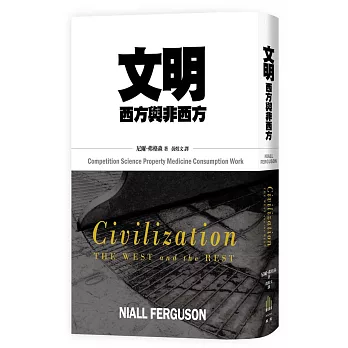The Myra Hess concer MY PRAYER. During the Second World War, the pianist Myra Hess put on concerts at the National Gallery to raise morale. ts
During the Second World War, the pianist Myra Hess put on concerts at the National Gallery to raise morale. Find out how the Gallery opened as a music venue
How the concerts started
Discover how the concerts became popular with wartime Londoners
Playing through the bombing
Bombs fall and the musicians play on. How Myra Hess and the Gallery coped during the Blitz
Meet the musicians
London's favourite wartime music: Bach or Stravinsky?
Concerts or art?
The campaign to keep the concerts after the end of the war
A Good Run 精彩旅程

1950年代以後,東亞國家,尤其是成長中的中國,在經濟現代化取得重大進展,現在足以與西方抗衡。弗格森指出我們正經歷「西方主導世界五百年的終結」。-----紐約時報
Excellence in these categories, Ferguson says, may explain the West’s remarkable rise, but late in the 19th century “the Rest,” especially Japan, began to catch up in all but internal competition and representative government. By the 1950s states in East Asia, especially and increasingly China, made great strides in economic modernization and now compete successfully against the West. At present, he says, we are experiencing “the end of 500 years of Western predominance,” and he foresees the possibility of a clash between the declining and rising forces. He wonders “whether the weaker will tip over from weakness to outright collapse.”
內容簡介
文明 : 西方與非西方
CIVILIZATION The West and the Rest
wwwww
尼爾·弗格森在其著作《文明:西方與世界其他地區》中指出,自15世紀以來,西方在全球的主導地位歸功於六大「殺手級應用」:競爭、科學、法治、現代醫學、消費主義和職業道德。本書分析了西方如何發展出這些概念,並探討了隨著其他文化如今也「借鑒」這些優勢,西方霸權可能面臨的衰落。
西方霸權的六大“殺手級應用”
競爭:歐洲的政治分裂造就了競爭環境,刺激了經濟和政治創新。
科學:以印刷術等技術進步為驅動的科學革命,使西方在理解和利用世界方面獲得了顯著優勢。
法治:弗格森指出,西方發展的法律體系與其他更中央集權的帝國截然不同,為經濟和政治穩定奠定了基礎。
現代醫學:醫學的進步延長了壽命,提高了人口健康水平,這在殖民擴張和戰勝競爭對手方面是一項顯著優勢。
消費主義:西方發展出一種消費文化,推動了工業革命和全球市場的形成。
工作倫理:弗格森認為,受宗教影響的特定工作倫理是西方經濟成功的關鍵因素。
西方強權的衰落
核心論點是,西方正在失去其主導地位,因為其他地區已經成功地採納並發展了這六項「殺手級應用」。
弗格森指出,雖然西方曾經壟斷了這些概念,但現在卻對它們失去了信心,而世界其他地區則變得更加充滿活力和創新。
- Competition: The political fragmentation of Europe created a competitive environment that spurred economic and political innovation.
- Science: The scientific revolution, fueled by advancements like the printing press, gave the West a significant advantage in understanding and exploiting the world.
- The rule of law: Ferguson points to the development of systems of law that were different from the more centralized empires elsewhere, creating a framework for economic and political stability.
- Modern medicine: Advances in medicine led to longer lifespans and healthier populations, which was a significant advantage in colonization and outliving rivals.
- Consumerism: The West developed a culture of consumption that helped drive the Industrial Revolution and global markets.
- The work ethic: Ferguson argues that a particular work ethic, influenced by religion, was a key factor in the West's economic success.
- The core argument is that the West is losing its preeminence because the Rest have now successfully adopted and adapted these six "killer apps".
- Ferguson suggests that while the West once had a monopoly on these concepts, it is now losing faith in them, while other parts of the world are becoming more dynamic and innovative.

沒有留言:
張貼留言